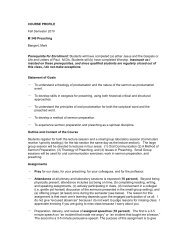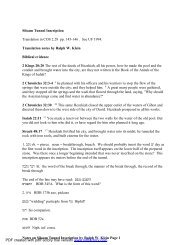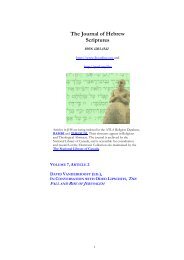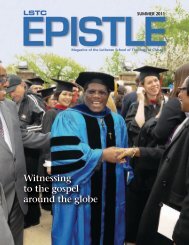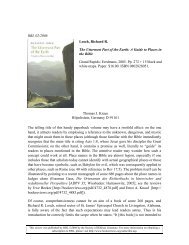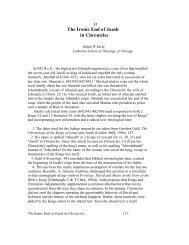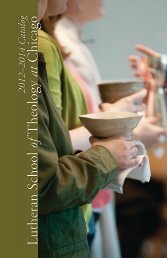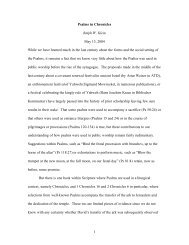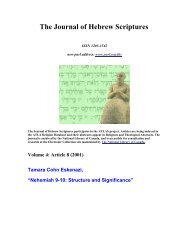Metacommentating Amos* Metacommentary, what is that ... - Fontes
Metacommentating Amos* Metacommentary, what is that ... - Fontes
Metacommentating Amos* Metacommentary, what is that ... - Fontes
Create successful ePaper yourself
Turn your PDF publications into a flip-book with our unique Google optimized e-Paper software.
4. <strong>Metacommentating</strong> Amos 17Amos’s message was a devastating attack on the social evils of theday, particularly on the heartlessness and d<strong>is</strong>honesty with whichthe rich had ground down the poor . . . , but also on the immoralityand the careless pursuit of luxury which had sapped the nationalcharacter . . . —all of which he viewed as sins <strong>that</strong> Yahweh wouldsurely pun<strong>is</strong>h. 24The metacommentator <strong>is</strong> bound to ask whether modern scholarsare aware of <strong>what</strong> they are doing. They are adopting the view,and presenting it as their own, <strong>that</strong> the best way, or perhaps theonly way, of dealing with heartlessness, d<strong>is</strong>honesty, immoralityand luxury (to adopt Bright’s terms) <strong>is</strong> to wipe the offenders outof ex<strong>is</strong>tence. The metacommentator observes (but <strong>is</strong> notsurpr<strong>is</strong>ed) how, when it <strong>is</strong> the deity who <strong>is</strong> pun<strong>is</strong>hing, highmindedcommentators who would not harm a fly themselvessuddenly join the hanging and flogging brigade and think nopun<strong>is</strong>hment too severe.Nor do the commentators seem to notice the conflict betweenthe apparent justice of pun<strong>is</strong>hing those who deserve it and theobvious injustice of pun<strong>is</strong>hing those who do not. Mays, forexample, can write <strong>that</strong> the ‘prophecy of Amos can be heard asYahweh’s response to their [the poor’s] cry, for the weak andpoor are the special objects of Yahweh’s compassion andconcern’; 25 but at the same time he can say <strong>that</strong> ‘the cons<strong>is</strong>tentburden of h<strong>is</strong> [Amos’s] oracles <strong>is</strong> to announce the d<strong>is</strong>aster <strong>that</strong>will fulfil Yahweh’s decree of an end for h<strong>is</strong> people’. 26 Hedoesn’t seem to notice <strong>that</strong> Yahweh can’t be very compassionateto the poor if he intends them to be carried into exile because ofthe wrongdoing of their leaders, or <strong>that</strong> the prophet’s demandfor justice does not seem to apply to the deity. 2724 . John Bright, A H<strong>is</strong>tory of Israel (London: SCM Press, 3rd edn, 1981),p. 262.25 . Mays, Amos, p. 10.26 . Mays, Amos, p. 9.27 . Here <strong>is</strong> a typical commentatorial utterance on the subject: ‘The conceptionof Yahweh which Amos entertains <strong>is</strong> <strong>that</strong> of a god of justice ...[Amos] makes the idea the very centre of h<strong>is</strong> conception of God ... Righteousnessbeing a vital element in Yahweh’s character, he not only willdemand it in those who profess to be h<strong>is</strong> followers, but will also enforce thedemand ... It <strong>is</strong> a demand for justice, which, in its simplest and most naturalform, includes honesty, integrity, purity, and humanity ... It demands the




